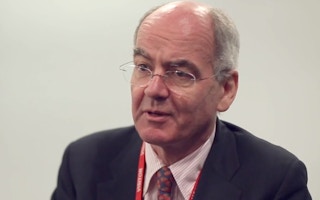Sustainability guru John Elkington, who coined terms such as the “triple bottom line” and “people, planet and profit”, has said that compromises made in sustainable development such as “clean coal” would mean missing climate goals, and highlighted the perils of misleading corporate sustainability reports written by public relations firms.
Speaking at the CIMB-organised Cooler Earth Summit conference on Tuesday 8 September, Elkington said that tens of thousands of companies around the world are publishing sustainability reports “with beautiful covers”, but they’re often so different in nature and structure that they’re difficult to compare. Some contain “built-in trade offs”, he said.
Elkington referred to a sustainability report for a Siberian coal company that claimed it was committed to sustainable energy by producing “clean coal”.
“In no stretch of the imagination can this [clean coal] be a true claim,” Elkington said. “PR companies produce reports like this.”
Big coal-producing countries such as Australia, China and Indonesia also talk about “clean coal,” which releases less air pollutants than standard coal. Detractors say there is no such thing as clean coal, the burning of which is the single biggest contributor to man-made greenhouse gas emissions.
“If we try to trade-off our way into the future, we are going to fail [in meeting sustainability goals],” said Elkington.
“
The sustainability revolution will be as big as the agricultural and information revolutions put together, and is coming at us at the speed of the information revolution.
John Elkington, founding partner and chairman, Volans
Elkington also questioned the approach of businesses to the United Nations’ Sustainable Development Goals (SDGs), a set of targets set in 2015 to achieve a more sustainable world by 2030.
He said that some corporates have tried to contribute to SDGs that are relevant to their business without an understanding of the scale of change required to achieve the goals.
“What people have failed to recognise is that the SDGs — which are really now the roadmap for sustainable development — are an exponential change agenda, not an incremental change agenda,” he said.
Using two SDGs — zero hunger and no poverty — as examples, he said that these goals cannot be achieved through incremental change — they require systemic change to achieve. “Even if you stretch the timeline to 2050 or 2060, they would be still be exponential goals,” he said.
The way the SDGs are being tackled is “probably going to be inadequate” over the next 10 to 15 years, he said.
Elkington also pointed out the limitations of the triple bottom line approach to business that he devised in 1994 to address the current climate and ecological crisis.
The triple bottom line is an accounting framework where performance is measured not only by profit, but social and environmental impact.
“Almost all triple bottom line work today has been about businesses being more transparent, accountable and responsible — which is fine. But it does not take us properly towards systems change,” he said.
Triple bottom line thinking had done little to prevent environmental problems like biodiversity loss from getting worse, Elkington noted.
However, Elkington, who is founding partner and chairman of sustainability consultancy Volans, argued that the business world has made major progress in how it perceived sustainability over the last 30 years, shifting from a denial of the need to change to driving the change agenda.
He added that, now, companies have moved on from looking for the business case for sustainability, to looking for business models and how to actually make money from socially and environmentally-based business ventures.
But he said the Covid-19 pandemic has forced companies to think more about resilience, not only against pandemics but other looming challenges such as climate change and biodiversity loss.
The new era of sustainability, which the Covid-19 pandemic had brought into focus, is about regenerative capitalism, Elkington said.
“We need to regenerate the systems on which we depend — the economic, social, and, critically, the environment,” he said. “Political and governance systems need regeneration too.”
Changing these systems would take decades, maybe even generations, but Elkington said that the world is at the beginning of a sustainability revolution that will transform the global economy and society.
Referencing a white paper penned by former politician and climate activist Al Gore’s company Generation Investment Management, Elkington said the sustainability revolution would be “as big as the agricultural and information revolutions put together, and is coming at us at the speed of the information revolution.”
“It won’t be an easy transition. Some people will make an immense amount of money from it, and others won’t,” he said.

















